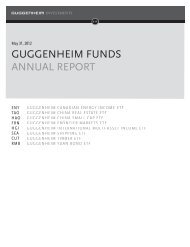Guggenheim Credit Allocation Fund GGM - Guggenheim Investments
Guggenheim Credit Allocation Fund GGM - Guggenheim Investments
Guggenheim Credit Allocation Fund GGM - Guggenheim Investments
- No tags were found...
You also want an ePaper? Increase the reach of your titles
YUMPU automatically turns print PDFs into web optimized ePapers that Google loves.
interest on its portfolio holdings. In any reorganization or liquidation proceeding relating to a portfoliocompany, the <strong>Fund</strong> may lose its entire investment or may be required to accept cash or securities with a valueless than its original investment. Among the risks inherent in investments in a troubled entity is the fact that itfrequently may be difficult to obtain information as to the true financial condition of such issuer. The Adviser’sjudgment about the credit quality of the issuer and the relative value and liquidity of its securities may prove tobe wrong.Structured finance investments riskThe <strong>Fund</strong>’s structured finance investments may consist of RMBS and CMBS issued by governmental entitiesand private issuers, ABS, structured notes, credit-linked notes and other types of structured finance securitiesdescribed in this Prospectus. Holders of structured finance securities bear risks of the underlying investments,index or reference obligation and are subject to counterparty risk. The <strong>Fund</strong> may have the right to receivepayments only from the issuer of the structured finance security, and generally does not have direct rightsagainst the issuer or the entity that sold the assets to be securitized. While certain structured finance investmentsenable the investor to acquire interests in a pool of securities without the brokerage and other expensesassociated with directly holding the same securities, investors in structured finance securities generally pay theirshare of the structured finance security issuer’s administrative and other expenses. The prices of indices andsecurities underlying structured finance securities, and, therefore, the prices of structured finance securities, willbe influenced by, and will rise and fall in response to, the same types of political and economic events thataffect issuers of securities and capital markets generally. If the issuer of a structured finance security usesshorter term financing to purchase longer term securities, the issuer may be forced to sell its securities at belowmarket prices if it experiences difficulty in obtaining short-term financing, which may adversely affect the valueof the structured finance securities owned by the <strong>Fund</strong>. Certain structured finance securities may be thinlytraded or have a limited trading market.The <strong>Fund</strong> may invest in structured finance securities collateralized by low grade or defaulted loans or securities.<strong>Investments</strong> in such structured finance securities are subject to the risks associated with below investment gradesecurities. Such securities are characterized by high risk. It is likely that an economic recession could severelydisrupt the market for such securities and may have an adverse impact on the value of such securities.The <strong>Fund</strong> may invest in senior and subordinated classes issued by structured finance vehicles. The payment ofcash flows from the underlying assets to senior classes take precedence over those of subordinated classes, andtherefore subordinated classes are subject to greater risk. Furthermore, the leveraged nature of subordinatedclasses may magnify the adverse impact on such class of changes in the value of the assets, changes in thedistributions on the assets, defaults and recoveries on the assets, capital gains and losses on the assets,prepayment on assets and availability, price and interest rates of assets.Structured finance securities are typically privately offered and sold, and thus are not registered under thesecurities laws. As a result, investments in structured finance securities may be characterized by the <strong>Fund</strong> asilliquid securities; however, an active dealer market may exist which would allow such securities to beconsidered liquid in some circumstances.MBS risksMBS represent an interest in a pool of mortgages. MBS are subject to certain risks: credit risk associated with theperformance of the underlying mortgage properties and of the borrowers owning these properties; risks associatedwith their structure and execution (including the collateral, the process by which principal and interest paymentsare allocated and distributed to investors and how credit losses affect the return to investors in such MBS); risksassociated with the servicer of the underlying mortgages; adverse changes in economic conditions andcircumstances, which are more likely to have an adverse impact on MBS secured by loans on certain types ofcommercial properties than on those secured by loans on residential properties; prepayment risk, which can lead tosignificant fluctuations in the value of the MBS; loss of all or part of the premium, if any, paid; and decline in themarket value of the security, whether resulting from changes in interest rates, prepayments on the underlyingmortgage collateral or perceptions of the credit risk associated with the underlying mortgage collateral. Inaddition, the <strong>Fund</strong>’s level of investment in MBS of a particular type or in MBS issued or guaranteed by affiliatedobligors, serviced by the same servicer or backed by underlying collateral located in a specific geographic region,may subject the <strong>Fund</strong> to additional risk.11



